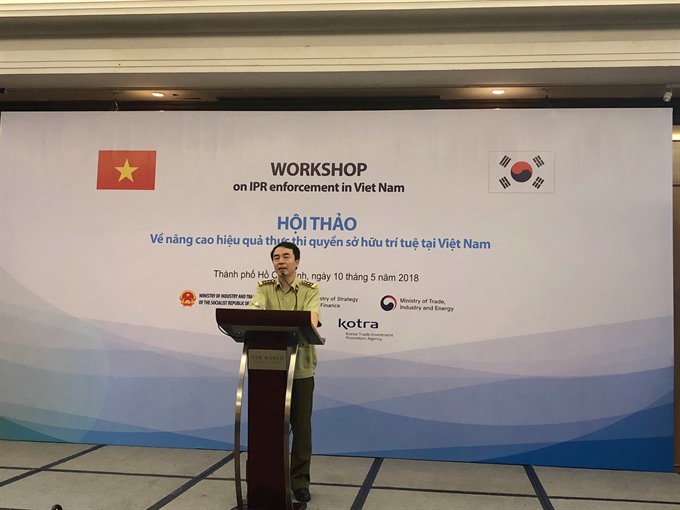Viet Nam will continue to ensure enforcement of intellectual property rights violations and strictly deal with violators, representatives of the Market Surveillance Agency (MSA) under the Ministry of Industry and Trade said at a forum on raising IPR awareness held yesterday in HCM City.

Viet Nam will continue to ensure enforcement of intellectual property rights violations and strictly deal with violators, representatives of the Market Surveillance Agency (MSA) under the Ministry of Industry and Trade said at a forum on raising IPR awareness held yesterday in HCM City.
Tran Hung, MSA’s deputy director, said: “Enforcement of intellectual property rights (IPR) is increasingly important for the socio-economic development of the country.”
While Viet Nam has achieved positive results fighting IPR violations, anti-counterfeit activities and IPR enforcement were still not strong enough, he said.
Vu Xuan Binh, deputy director of the Anti-Counterfeiting Department, said there were 4,799 cases of counterfeit goods and IPR violations last year, with total fines of VND73.8 billion.
There were also a total of 273 cases of imitation of quality and utility, 3,518 cases of imitation of geographical indications, trademarks and packages, 395 cases of imitation of stamps and packaging labels, and 608 cases of infringement of IPR.
Yusun Park, of the Korea Invention Promotion Association (KIPA), said that the number of counterfeit goods and IP violations increased in a strong, growing economy.
She said that South Korea faced similar problems many years ago but thanks to co-operation between the government, businesses and the public, they were able to overcome the situation.
Jaeheon Lee, of the Korea Intellectual Service Centre (KISTA), said the production of counterfeit goods increased as a result of high profits made by distributing counterfeit goods and prioritising cost over quality among businesses, and preference for famous foreign brands among consumers.
Profits earned from selling counterfeit goods were even higher than the fines that violators must pay, he said. Counterfeit products detected in Viet Nam were mainly food items, medicine and cosmetics.
He said that South Korean companies in Viet Nam faced four types of IPR violations: infringement of trademark due to registration by agents or partners; simple theft infringement; online infringement of IPR; and industrial design infringement.
With the growing importance of the Vietnamese market, and the increased number of foreign enterprises in Viet Nam, including those from Korea, there would be possible future patent disputes, he said.
To prevent counterfeit goods, enterprises need to register trademarks, patents and other IP rights; allow the use of IR only by the local agent; refrain from registering any IPR under the agent’s name; and file patent applications before taking part in exhibitions among other strategies, he added.
Korean experts at the meeting also gave their assessment of the IPR enforcement system and infrastructure for IPR protection in Viet Nam.
They said there had been an increase in the number of patents filed in Viet Nam, mainly from foreign entities. This showed an effort made by individuals, organisations and enterprises in protecting IPR.
But in reality, there were still counterfeits goods in the market as well as many infringements of intellectual property cases, they said.
Experts suggested measures to improve enforcement of IPR in Viet Nam, including strengthening civil measures and improving sanctions to increase deterrence.
They said that serious infringements of IPR, which cause great damage or recidivism, should be handled under criminal law.
In addition, eliminating overlapping IPR enforcement and strengthening the role of associations, enterprises, newspapers and consumers were needed.
Lee said the Government should work with enterprises to strengthen regulations related to counterfeit goods
Other preventive measures would include medium- and long-term strategic plans for training human resources involved in IPR enforcement; and enhancing public-private partnerships in the identification of genuine goods and counterfeit goods.
Yusun said businesses in Viet Nam should pay more attention to protecting their brands and co-operate with authorised agencies that handle violations if they face IPR infringement.
In a related matter, the HCM City Market Management Department yesterday organised five teams to inspect the sales of counterfeit eyeglasses and watches at Ben Thanh Market, according to Hung.
He said that Viet Nam would strictly deal with trade fraud and IPR violations as well as create a sound business environment to enable investors to feel secure when investing in the country.
The forum was organised by MSA in collaboration with Korea Trade-Investment Promotion Agency. — VNS





